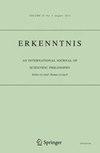Reproductive Work and Productive Fairness
IF 0.8
2区 哲学
0 PHILOSOPHY
引用次数: 0
Abstract
Abstract In academic and public debates, defenders of the case for sharing the costs of children often claim that by having and rearing children parents produce public goods for the rest of society, or perform socially valuable or necessary labour, and that it would be unfair to parents for others to not share the costs of children, for example through publicly funded parental leave and schools for this reason. Critics of the public goods argument have claimed that it fails because there is no defensible principle that can serve to buttress the claims of parents. Furthermore, these same critics, as well as others, have argued that a certain view of liberal equality militates against sharing the costs of children.This paper challenges both the contention that there is no defensible principle of fairness that can buttress the public goods argument and the contention that liberal equality militates against socialisation. It accomplishes these two tasks together, arguing that the ideal of equality of resources, rather than militating against socialisation, in fact grounds a principle of productive fairness that can serve as the normative premise of the public goods argument for sharing the costs of children.生殖工作和生产公平
在学术和公共辩论中,分担孩子成本的辩护者经常声称,通过生育和抚养孩子,父母为社会其他部分生产公共产品,或从事有社会价值或必要的劳动,而其他人不分担孩子的成本对父母来说是不公平的,例如,出于这个原因,通过公共资助的育儿假和学校。公共物品论的批评者声称,它之所以失败,是因为没有可辩护的原则可以用来支持父母的主张。此外,同样是这些批评者,以及其他人,认为某种自由平等的观点不利于分担孩子的成本。本文既挑战了没有可辩护的公平原则可以支持公共产品论点的论点,也挑战了自由平等不利于社会化的论点。它同时完成了这两项任务,认为资源平等的理想,而不是阻碍社会化,实际上建立了一个生产公平的原则,可以作为分担儿童成本的公共产品论点的规范性前提。
本文章由计算机程序翻译,如有差异,请以英文原文为准。
求助全文
约1分钟内获得全文
求助全文
来源期刊

ERKENNTNIS
PHILOSOPHY-
CiteScore
2.10
自引率
11.10%
发文量
116
期刊介绍:
Erkenntnis is a philosophical journal publishing papers committed in one way or another to the philosophical attitude which is signified by the label ''scientific philosophy''. It concentrates on those philosophical fields which are particularly inspired by this attitude, although other topics are welcome as well. These fields are:- Epistemology - Philosophy of science, foundations and methodology of science in general and of natural and human sciences such as physics, biology, psychology, economics, social sciences in particular - Philosophy of mathematics - Logic, philosophy of logic, and all kinds of philosophical logics - Philosophy of language - Ontology, metaphysics, theory of modality - Philosophical psychology, philosophy of mind, neurophilosophy - Practical philosophy, i.e. ethics, philosophy of action, philosophy of law, etc. One of the objectives of Erkenntnis is the provision of a suitable platform for the discussion of controversial issues; another is the provision of timely, competent reviews of important publications in an ever-growing field of research.In recent years, philosophers standing quite outside the pale of analytic philosophy have also paid careful, and indeed most welcome, attention to precision of concept and language, to arguments, and to well-grounded foundations. Erkenntnis provides for them, and for philosophers of all persuasions, a place of meeting, of discussion, and of disputation.Erkenntnis was originally founded in 1930 by Rudolf Carnap and Hans Reichenbach, it was revived in 1975 by Carl G. Hempel, Wolfang Stegmüller, and Wilhelm K. Essler. You can find more information about this in the article “Hempel: The old and the new ‘Erkenntnis’” accessible in the tabs to the right.Today, Erkenntnis is one of the leading journals in philosophy worldwide and attracts first-class authors at all stages of career; from young philosophers at the PhD level up to established academic philosophers and highly renowned senior scholars. We pride ourselves on supplying our authors with substantial referee reports, subject to a turnaround time of about three months until the first decision. The acceptance rate for publications in the journal is presently slightly below 10%.
 求助内容:
求助内容: 应助结果提醒方式:
应助结果提醒方式:


